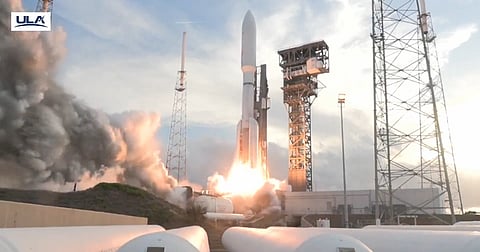

Amazon successfully launched 27 satellites for its Project Kuiper broadband constellation from Cape Canaveral Space Force Station on Monday, initiating a $10 billion effort to deliver global internet access and compete with SpaceX’s dominant Starlink network.
The satellites, carried by a United Launch Alliance Atlas V rocket, lifted off at 7 p.m. EDT, overcoming a weather-related delay from April 9.
Project Kuiper aims to deploy 3,236 satellites in low-Earth orbit to provide high-speed internet to consumers, businesses, and governments, particularly in underserved rural areas.
Amazon’s ambitious venture, first announced in 2019, faces a tight timeline, with the U.S. Federal Communications Commission requiring half the constellation — 1,618 satellites — operational by mid-2026.
Analysts suggest Amazon may request an extension due to its delayed start.
Amazon’s Kuiper enters a field led by SpaceX, which has over 8,000 Starlink satellites in orbit and serves more than 5 million users across 125 countries.
Amazon Executive Chairman Jeff Bezos expressed optimism about Kuiper’s prospects, stating, “There’s room for lots of winners there. I predict Starlink will continue to be successful, and I predict Kuiper will be successful as well.”
He added, “It will be a primarily commercial system, but there will be defense uses for these LEO constellations, no doubt.”
Amazon anticipates initial customer service later this year, potentially after confirming contact with the satellites from its Redmond, Washington, operations center.
The company plans up to five additional Kuiper launches in 2025, according to ULA CEO Tory Bruno.
Following successful 2023 prototype tests, Amazon’s latest satellites feature upgrades, including mirror film coatings to reduce sunlight reflection, addressing astronomers’ concerns about low-orbit constellations.
The company has secured 83 rocket launches from ULA, Blue Origin, and Arianespace, and unveiled affordable consumer terminals, aiming to produce millions for under $400 each.
Despite its late entry, Amazon leverages its cloud computing expertise and consumer product experience to differentiate Kuiper, targeting a market with growing demand for reliable connectivity.